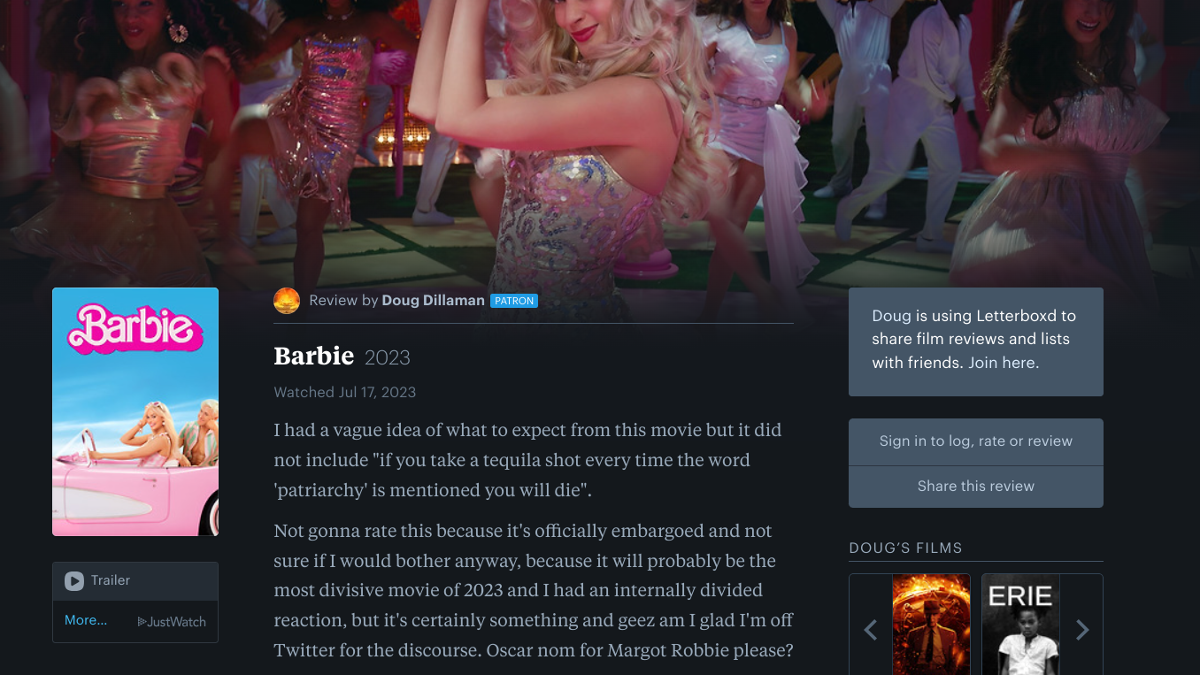After months of hype and a comprehensive marketing campaign that plastered cities across the globe in hot pink, Barbie is set to be released to a worldwide audience this Friday (July 21). Plenty of fans have been speculating about the direction the film will take, but one thing is definitely known about the plot: Margot Robbie’s “stereotypical” Barbie, after suffering from some very un-Barbie-like thoughts, leaves the utter perfection of Barbieworld for the real world in an attempt to get her idyllic life back. And, sadly for our heroine, this means bumping up against some real-world concerns, like the fact that it’s pretty damn misogynistic out there.
Directing a classic summer blockbuster with wide appeal that also delves into the basics of feminist theory is a tough line for director Greta Gerwig to walk (mostly because of all that misogyny), but as the first comments about the film come in from those who’ve been able to grab an early screening, a common theme is emerging: the Lady Bird and Little Women director has continued her exploration of characters on the verge of womanhood, and all that entails. This, of course, means how Barbie deals with — and Ken reacts to — discovering a patriarchal society that’s the opposite of a world with all-Barbie supreme court justices. A very serious topic, indeed, but one that could be turned into a deadly drinking game according to one reviewer, such is the film’s focus on the topic.

New Zealand-based filmmaker Doug Dilaman has posted a small snapshot of his thoughts on the new Gerwig flick, and although he hasn’t said anything that will break the embargo, he’s certainly let his readers know that Barbie is not shying away from controversy, albeit in a funny way. Having also seen an early screening, I can confirm his joke about turning the use of the word patriarchy into a drinking game is a reasonable assessment from a number’s perspective (although we’d have gone with a more stereotypically Barbie drink than tequila). Importantly, though, his statement that it will be a divisive film also rings true, but in a much sadder way.
Of course, it shouldn’t be controversial to say that we live in a patriarchal society, as that notion is borne out by several facts: in the vast majority of fields women have noticeably less power and stature than their male counterparts; globally it’s estimated 38 percent of murdered women are killed by a partner; thanks to societal factors women earn less than men across the board, not ideal in a world that makes economic worth the most important part of a person’s value; and about a million other things. The fact that other countries and cultures are more repressive towards women isn’t quite the same saving grace some think it is, either.
Yet, because people (and bots) are predictable, it’s almost certain that there will be countless Jordan Peterson fans seething during screenings, before rushing home from the film so they can go online and quote studies about how domestic violence is actually evenly split by gender while ignoring the fact that violent and deadly domestic abuse vastly disproportionately affects women. Or, for the less academically-minded misogynists, arguing that She-Hulk being made means sexism is dead. Regardless, there’s sure to be a flurry of review bombs and nonsensical comments about the movie being propaganda or man-hating.
There are certainly some valid criticisms of a Barbie film attacking the patriarchy, but these all come from more radical feminist perspectives. For example, the doll famously reinforced unreasonable beauty standards for decades, so perhaps a film lionizing the Mattel creation isn’t best placed to lecture the world about feminism. And then there’s the strong link between capitalist thought and misogyny, which means that a film that is, at its heart, a celebration of a product is also not an ideal vehicle for identity politics. Then again, asking a film about a doll to right the world’s wrongs is already a tough ask, and by simply pointing issues out to a wider audience in a somewhat subversive way, perhaps Gerwig will make a difference.
Or maybe it is best for us all to drink ourselves into oblivion by playing the patriarchy game. Either way, Barbie is set to be a box office smash, and in the end, that’s all the producers will really care about.

